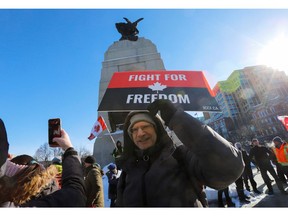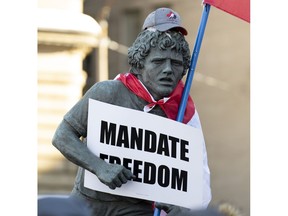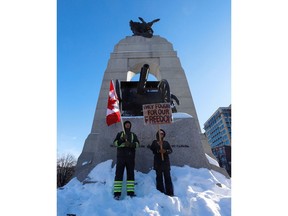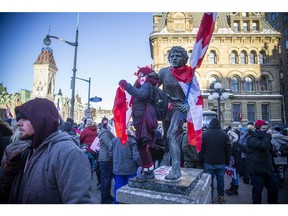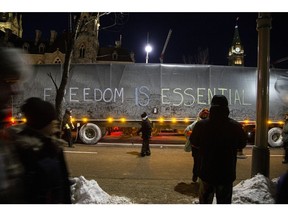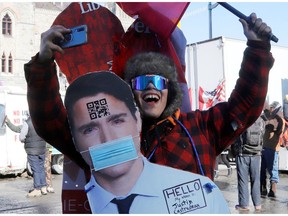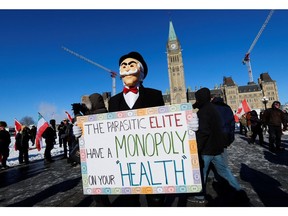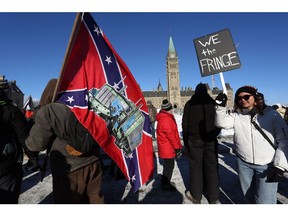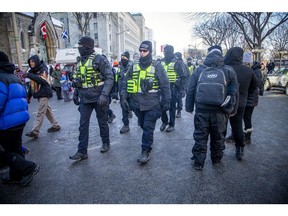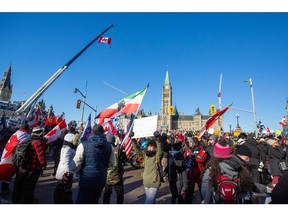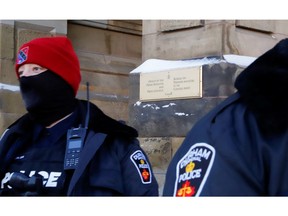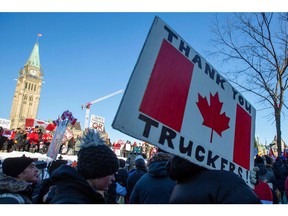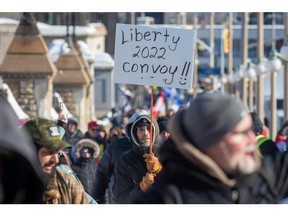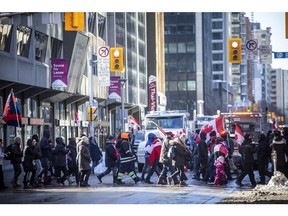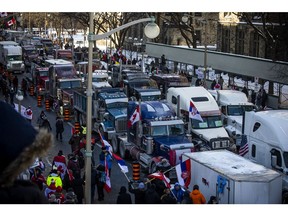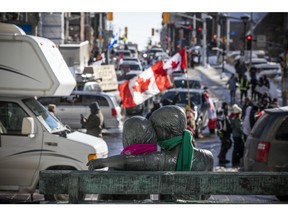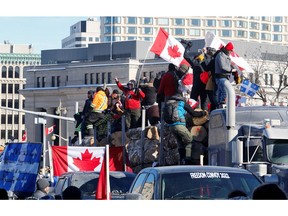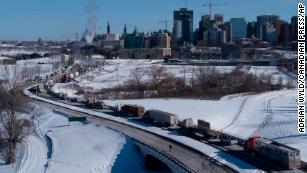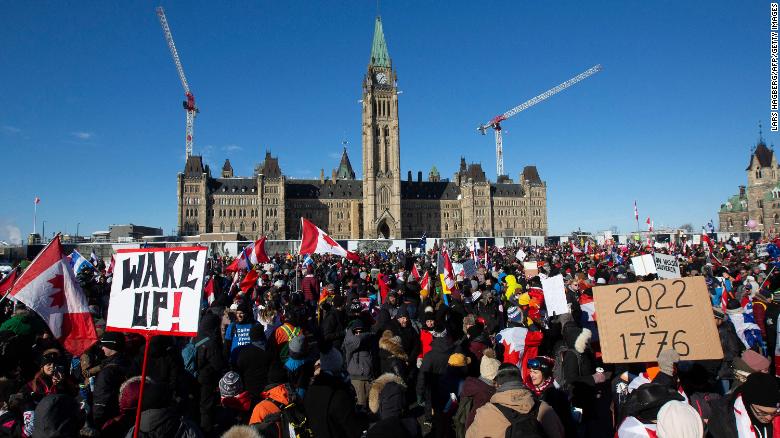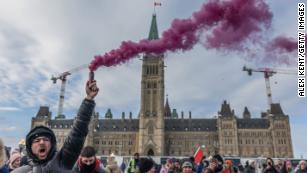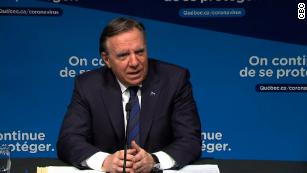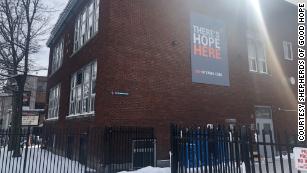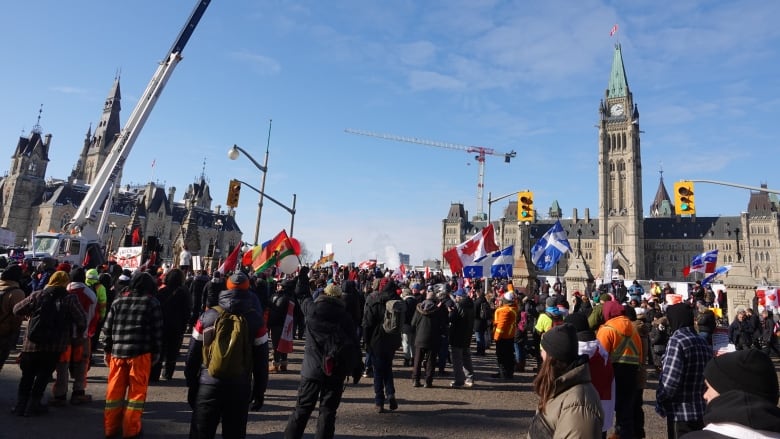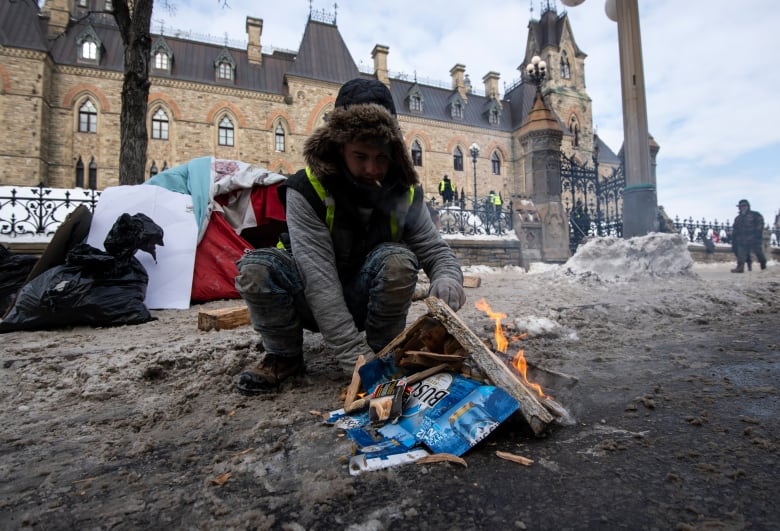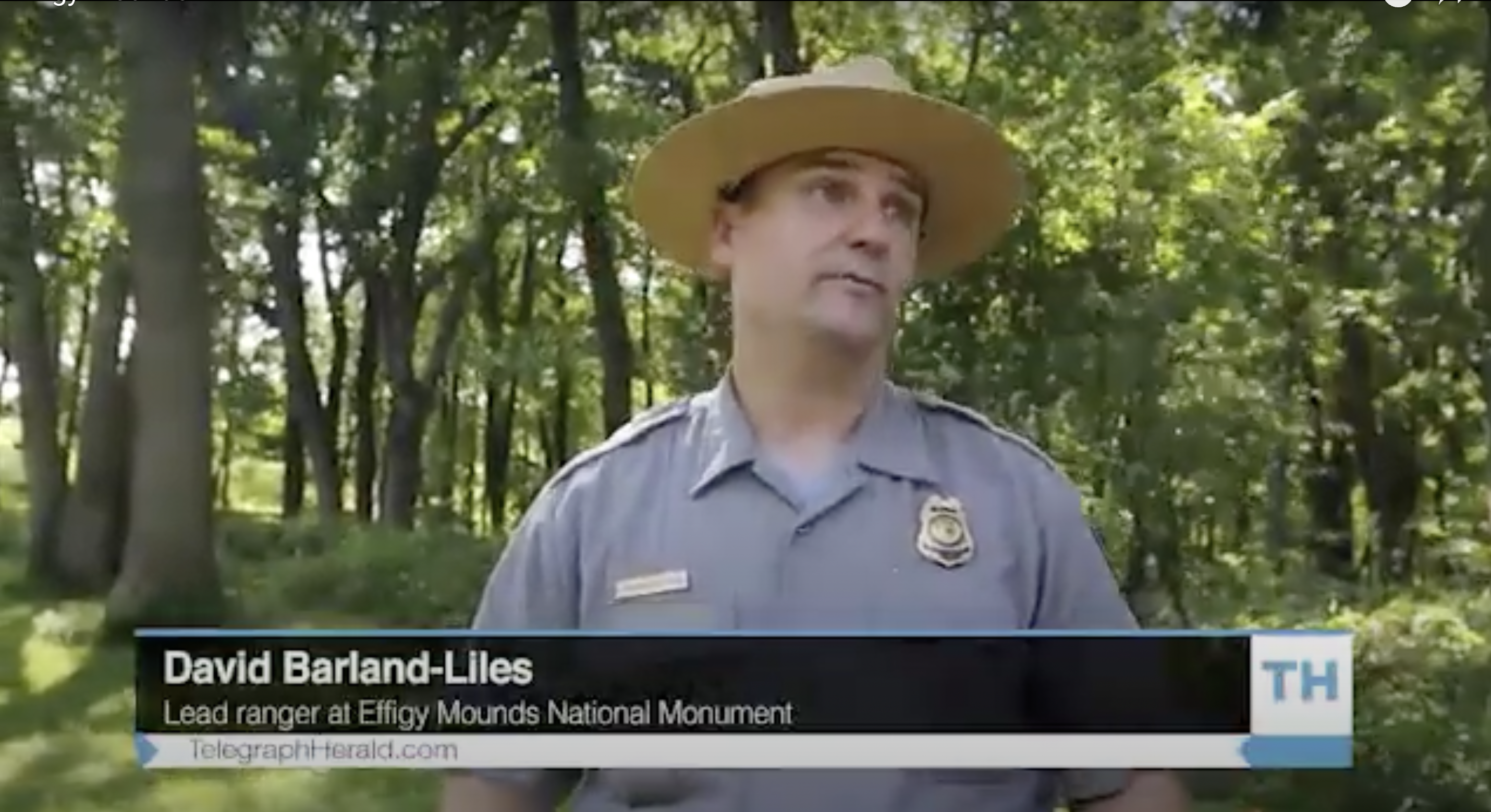Protests in Canada catch the eye of U.S. right wing, because they look familiar
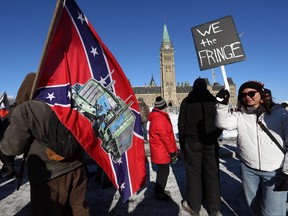
Article content
WASHINGTON — Despite his reputation for hair-trigger unpredictability, Donald Trump had a remarkably consistent track record for triggering paroxysms north of the border: all he ever had to do was mention Canada by name.
Advertisement
Article content
Whatever else life outside the White House has dealt the former president, his ability to resonate with Canadians who either love him or hate him appears undiminished.
“The Canadian truckers, you’ve been reading about it,” Trump said to lusty cheers during a weekend rally in Texas, acknowledging ongoing protests that have snarled traffic at the Canada-U.S. border in Alberta and turned life upside down on and around Parliament Hill.
“We want those great Canadian truckers to know that we are with them all the way. They’ve really shown something.”
Indeed they have: the flag-draped semi-trailers, blaring horns and maskless protesters that have swarmed the national capital since Friday offer incontrovertible proof that Canada is not immune to the bitterly angry, Trump-style populism that swept the U.S. more than five years ago.
Advertisement
The protest is ostensibly fuelled by Canada’s requirement that truckers be fully vaccinated against COVID-19 to enter the country — a rule the U.S. has as well. But it’s just as much about pandemic restrictions more broadly, including vaccine mandates and mask requirements.
Trump is hardly the only one who’s noticed.
Georgia congresswoman Marjorie Taylor Greene, one of the most unapologetic and controversial acolytes of the former president on Capitol Hill, has repeatedly expressed her support for the protesters, describing them on the alt-right social media forum Gettr as “standing against tyranny.”
Republican National Committee chairwoman Ronna McDaniel tweeted her support over the weekend, while the Twitter account for Republicans on the House Judiciary Committee circulated drone footage of idling tractor-trailers, along with a rendition of “O Canada” and a single word — “Freedom!”
Fox News mainstay Tucker Carlson, meanwhile, could barely contain his delight Monday.
He castigated Prime Minister Justin Trudeau for taking a hard line with protesters — some brandished Nazi symbols, defiled the National War Memorial and harassed shopkeepers for enforcing mask policies — without acknowledging the larger group’s various grievances.
“These were working-class people. They’re the guys who deliver your Amazon boxes. And Justin Trudeau is repulsed by them,” Carlson said during the segment.
Advertisem
Article content
“Justin Trudeau won’t meet with them because he never meets with people like this — not simply because they are blue-collar and dirty but because they disagree with him.”
That illustrates the danger of singling out the bad conduct and “tarring everybody with the same brush,” warned Bob Pickard, a veteran public relations expert and principal at Toronto-based Signal Leadership Communication Inc.
That ultimately alienates Canadians who might sympathize with the broader message, even if they don’t condone the behaviour of a select few, adding fuel to the fires of outrage in the white-hot kiln of social media.
“On social media, the usual suspects are all going to engage with Mr. Trudeau on the left, and that would include a lot of moderate or centrist Canadians,” Pickard said.
“But the more there is the activation of intense emotions online, the more the other side — the algorithm of Twitter, for example — will pour gas on the fire of the other side of the algorithm, almost like a knee-jerk backlash.”
Public Safety Minister Marco Mendicino said it will be important to draw a clear distinction between informed, passionate debate and unacceptable conduct as Canada works to put COVID-19 in the rear-view mirror.
“I think in some ways it is important to have an ongoing, very rigorous debate about how to get out of the pandemic,” while drawing “some bright lines and some boundaries” around unacceptable behaviour, Mendicino said Tuesday.
Advertisement
“I think many of us have seen an uptick in the expressions and the incitements of hate and violence, and that is troubling, and I think we need to really be sure that we are identifying and taking the appropriate actions that are necessary.”
The protests have conjured memories of Jan. 6 last year, when Trump supporters taking part in a massive demonstration on Capitol Hill ran amok through the halls of Congress in an ultimately unsuccessful effort to prevent the certification of President Joe Biden’s election victory.
Those protests were similar in that they were attended, for the most part, by Americans with both a deep-seated antipathy toward the institution of government and a new-found interest in politics, thanks to Trump.
“Because they’re not really an organized movement, they’re just impulsive, and things get carried away,” said Sands.
“Some invariably use Confederate flags, swastikas, profanity-laden placards and other symbols that are meant to get a rise out of people, that are meant to provoke, because what they’re trying to do is get attention and vent frustration and feel that whatever it is that’s bothering them, somebody will listen.”
That’s one of the deep ironies of modern-day, fury-fuelled populism in a polarized society: the shock-and-awe tactics of certain protesters oblige political leaders to denounce them, rather than offer the opportunity of a fair hearing.
It may be time to rethink that approach, said Sands, who is counting on the next generation of political leaders to recognize the need for a new way of doing things.
“I hope that they kind of rekindle the old politics of pragmatism. I hope that they see this and come out of it saying, ‘No, that’s not what we want,’ and try to find that common ground,” he said.
“I’m hoping that future generations, the lesson they take from this is, ‘A pox on all their houses, let’s take politics in a different direction, we’re trying to practice politics differently.”‘
Jesse Watters Says Trudeau ‘Looks Like He Wet His Pants’ and Greg Gutfeld ‘Almost’ Calls Him a ‘Douchebag’
A segment on Tuesday’s edition of The Five became especially raucous as the cohosts took turns bashing Canadian Prime Minister Justin Trudeau.
At issue was Canada’s Covid-19 vaccine mandate for truckers. The policy requires all truckers returning from the United States to show proof of vaccination. In response, thousands of anti-mandate truckers and other protestors have participated in a “freedom convoy” that arrived in the capital city of Ottawa over the weekend.
In some instances, fringe elements have embedded themselves in the protests and displayed Nazi symbolism.
The Five played a clip of Trudeau reacting to the protests in a video statement.
“I have attended rallies and protests in the past when I have agreed with the goals,” he said. “But I have also chosen to not go anywhere near protests that have expressed hateful rhetoric.”
“He looks like he wet his pants,” said Jesse Watters. “I have not seen any barbarians with tiki torches and pitchforks. These seem like reasonable people that just want to work.”
Greg Gutfeld stated, “Canada should be ashamed of this–god, I almost said ‘douchebag.’ But I’m not! He’s a callow leader. This is a guy who backed a fraudulent BLM form his safe little perch and then he sells out – well he did that to help alleviate his own blackface scandal. That’s why he did it. Then he sells out his own citizens. He’s not a P.M., he’s a B.M.”
“What does B.M. stand for again?” asked Geraldo Rivera.
“Bowel movement,” replied Watters.
“Oh god,” sighed Jeanine Pirro.
Later in the segment Dana Perino expressed concern that discontent among truckers in Canada could exacerbate inflation in the U.S.
“Also, want to have an inflation problem?” she said. “How much is bacon now?”
“Ten,” answered Watters.
How much do you think it will be after this?
“Twenty,” he replied.
“Biden and Trudeau are on the wrong side of this,” she concluded.
Brad Reed
February 01, 2022

Rep. Chip Roy (screenshot)
CNN fact checker Daniel Dale on Tuesday took Rep. Chip Roy (R-TX) to task for twice promoting an utterly baseless internet rumor about Canadian Prime Minister Justin Trudeau fleeing to the United States to escape the caravan of angry truckers protesting his vaccination mandates.
In writing up Roy's claims, Dale shows that the story about Trudeau fleeing to America "was initially circulated by an anonymous Twitter account" and had not been reported by anything remotely resembling a credible news publication.
Dale even went so far as to track down the person who runs the anonymous account to see where they had gotten their false information about Trudeau fleeing the country in the wake of a trucker revolt.
"The person behind the 'Terror Alarm' account told CNN that their name is Libi Cohen and that they had gotten their initial information about Trudeau having fled to the US 'from local Israeli media,'" writes Dale. "But when asked for more specifics about the source, they pointed only to an obscure Twitter account with fewer than 4,000 followers, "Masonic Mission," whose tweets are currently "protected" and unavailable to the general public."
Roy has still not deleted the tweets about Trudeau fleeing as of this writing.
